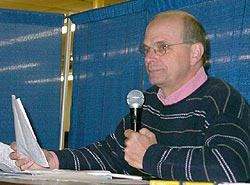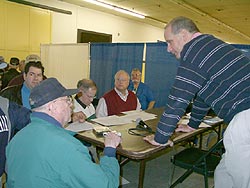NU9N SSB Audio News Editorial - April, 2003 |
| Hollingsworth Preaches Courtesy, Common Sense at Richmond Frostfest NEWINGTON, CT, Feb 13, 2003--FCC Special Counsel Riley Hollingsworth told those attending his forum at the Richmond, Virginia, Frostfest February 9 that Amateur Radio enforcement still has a long way to go, but that amateurs
can do a lot through peer pressure to head off problems before they become enforcement issues.
"Enforcement is no substitute for courtesy and common sense," Hollingsworth declared. "More courtesy would go a long way. He said he expects the FCC to continue its current level of amateur enforcement at least for the next several years, despite the budget juggling going on in Washington. Hollingsworth again suggested that amateurs "operate so that listeners will be impressed with Amateur Radio," not offended or turned off by it. He said wareness of Amateur Radio is on the rise in the wake of media attention
since September 11, 2001, and, more recently, with ham radio assistance in the search for debris from the shuttle Columbia. He pointed to 20 and 75 meters as the current enforcement hot spots as well as the bands where the least
courteous operating practices are found--some of which he described as "a disgrace" to the Amateur Service.
Off-the-air peer pressure, he said, is an effective tool to provide guidance to amateurs who may be unaware of how they sound to others on the air. "Some of what you hear on 75 meters at night is far worse than what
we ever heard on CB," Hollingsworth asserted.
The reactions of some hams when they confront interference--or perceived interference--can be worse than the original interference--whether or not it's deliberate. "Don't overreact," Hollingsworth advised. "The best reaction is no reaction whatsoever." Hollingsworth pointed out that some of those who deliberately cause interference "just want an audience, and commenting on it on the air only makes it worse." "You have to always be aware of your image and be willing to protect it," he told those gathered in the packed forum. "You can't shoot yourself in the foot." More than 1000 attended the Richmond Frostfest, sponsored by the Richmond Amateur Telecommunications Society. Hollingsworth reiterated his belief that just because something is strictly legal doesn't mean it's something that amateurs should be doing. "It's the reckless exercise of rights that sometimes leads to their restraint," he said. He also urged amateurs not to become complacent that the amateur bands are not under pressure from other services. Even the HF bands are not immune, he pointed out. Controversy Surrounds New Technology, Experimentation
The use of new technology and on-the-air experimentation also sometimes brings controversy to the amateur bands, Hollingsworth said, and may prompt an occasion for the FCC to revisit its current Part 97 Amateur Service
rules. Hollingsworth pointed to Voice over Internet Protocols (VoIP) applications such as EchoLink and IRLP as an example.
While some have questioned their legality--or even whether they constitute Amateur Radio--his opinion was that these were helping to rejuvenate interest in Amateur Radio and even helping to bring some people back into the hobby. Another issue is the use of so-called "enhanced SSB," where experimenters have been attempting to achieve full-carrier AM-like high-fidelity audio in that mode. Hollingsworth said the presence of the enhanced SSB experimenters has led to complaints to the FCC--as many as 20 per week--that these signals are taking up excessive bandwidth. Hollingsworth told his Richmond audience that deliberately operating a wideband mode in a crowded spectrum is "shortsighted and rude," may be ignoring the "minimum bandwidth necessary" rule. If its use isn't accompanied by courtesy and common sense, he said, it will lead to pressure on the FCC to revise the Amateur Service rules. The FCC defines bandwidth as "the width of a frequency band outside of which the mean power of the transmitted signal is attenuated at least 25 dB below the mean power of the transmitted signal within the band." The "Emission Standards" section of Part 97--specifically §97.307(a) and (b)--requires amateur transmissions to not occupy "more bandwidth than necessary for the information rate and emission type being transmitted, in accordance with good amateur practice" and to "not cause splatter" on adjacent frequencies. Hollingsworth said the bandwidth of a given signal is not easily determined by the average amateur transceiver--even one equipped with a band scope of some sort. He pointed out that the problems with apparent splatter can be aggravated by the use of a noise blanker on the receiving end. Hollingsworth said he'd like to see the amateur community will deal with the issue intelligently and on its own. "Just because it sounds wide doesn't mean it is wide," he said. He said he'd prefer that the amateur community come up a way to accommodate such experimentation, because "a government solution will be worse than the problem." |
| John M. Anning - NU9N
e-Mail: |
Home | Intro | About | Rx | Tx | Extended
SSB | AM | Rec/Play | Photos | Feedback | Sites | MP3
Apologetics 1 | Apologetics 2 | Audio Glossary | Donate | eSSB Mods | eSSB Ready Rigs | Transmitter Settings for eSSB
File Downloads | News | Radio Connections | Transmitter Settings | Scope Your Audio | Site Map | Site Search | T-Pad Calculator
Apologetics 1 | Apologetics 2 | Audio Glossary | Donate | eSSB Mods | eSSB Ready Rigs | Transmitter Settings for eSSB
File Downloads | News | Radio Connections | Transmitter Settings | Scope Your Audio | Site Map | Site Search | T-Pad Calculator



